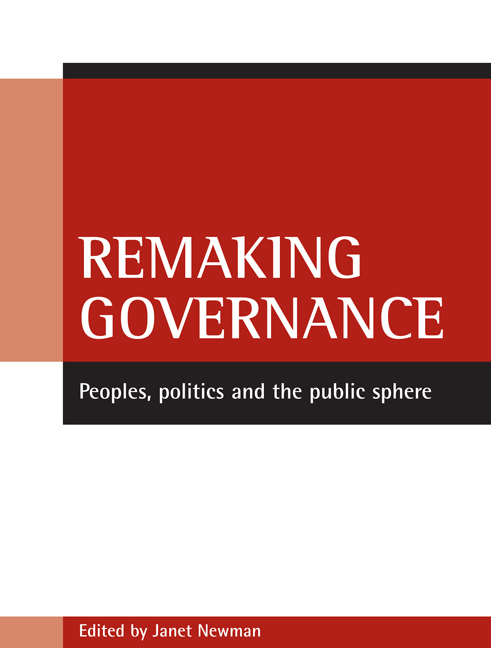Book contents
- Frontmatter
- Contents
- List of tables and figures
- Acknowledgements
- Notes on contributors
- Introduction
- one Reconstituting Europe: governing a European people?
- two Governance and the constitution of a European social
- three Remaking European governance: transition, accession and integration
- four Regendering governance
- five Welfare governance and the remaking of citizenship
- six Participative governance and the remaking of the public sphere
- seven Promoting democratic governance through partnerships?
- eight Among everyday makers and expert citizens
- nine Governance and the transformation of political representation
- Conclusion
- Index
seven - Promoting democratic governance through partnerships?
Published online by Cambridge University Press: 18 January 2022
- Frontmatter
- Contents
- List of tables and figures
- Acknowledgements
- Notes on contributors
- Introduction
- one Reconstituting Europe: governing a European people?
- two Governance and the constitution of a European social
- three Remaking European governance: transition, accession and integration
- four Regendering governance
- five Welfare governance and the remaking of citizenship
- six Participative governance and the remaking of the public sphere
- seven Promoting democratic governance through partnerships?
- eight Among everyday makers and expert citizens
- nine Governance and the transformation of political representation
- Conclusion
- Index
Summary
Introduction
Changing discourses and practices of governance sit uneasily with ideas of democracy. On the one hand, the much-debated move from government to governance is seen to represent an opening up of decisionmaking to a wider range of actors (Stoker, 1998). On the other hand, governance is also associated also with increased institutional fragmentation at all levels, so that much public decision-making has unclear lines of accountability to the public, and is linked only tenuously to structures of representative government. At the same time, governments and other organisations seem to be experimenting with new, innovative participatory practices (see Chapter Six of this volume and McLaverty, 2002), and many areas of policy now have an expectation of public or user involvement. These apparent contradictions raise questions about how democratic governance can be achieved within changing practices (Burns, 2000; Hirst, 2000). It is easy to be pessimistic about the prospects for democracy within governance, and to bemoan the ‘democratic deficit’ arising from unclear lines of accountability and legitimacy. But it is also possible that changing governance practices might open up new spaces and possibilities for democratic debate and public participation.
One of the most visible recent manifestations of changing governance practices is the growth of partnership arrangements for developing and delivering policy. As this chapter uses the term, partnerships denote a relatively formalised arrangement between two or more organisations in order to achieve a specific set of objectives, generally with a degree of independence from any one partner (Edwards et al, 2000; Painter and Clarence, 2001; Powell and Glendinning, 2002; Moseley, 2003). Many, although not all, partnerships are multi-sector, involving organisations from both the public and private or voluntary sectors, and are area-based, focused on policy or development for a specific geographic area. The partnership phenomenon is not restricted to any single national context, but is taking shape across many policy areas throughout Europe and beyond (see Geddes and Benington, 2001; Kjaer et al, 2003; Moseley, 2003).
Partnerships are at once a tangible result of the changing patterns of governance – part of the range of new and often fragmented institutions – as well as an encapsulation of some of the central trends underlying those changes. As such, they also illustrate some of the paradoxical relationships between governance and democracy.
- Type
- Chapter
- Information
- Remaking GovernancePeoples, Politics and the Public Sphere, pp. 139 - 158Publisher: Bristol University PressPrint publication year: 2005



